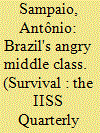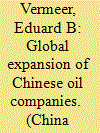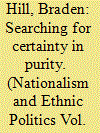| Srl | Item |
| 1 |
ID:
132471


|
|
|
|
|
| Publication |
2014.
|
| Summary/Abstract |
The recent protests show that secure democracy and an absence of extremism are no guarantee of domestic stability.
On 26 May 2014, just a few weeks ahead of the World Cup, an angry crowd surrounded the Brazilian football team in Rio de Janeiro. Striking teachers attacked the team bus as it left the city's international airport, protesting the government's vast expenditure on preparations for the event and neglect of the education system. Heavily armed military police were called in to clear a path for the vehicle, and have followed the players ever since. For many Brazilians, passion for football was supplanted by demands for better infrastructure, salaries and quality of life: the 12 June Brazil-Croatia game that opened the tournament followed a year in which one person was killed and hundreds were estimated to have been injured in demonstrations around the country. This article went to press before the four-week-long competition had finished; football mania was at the time returning to Brazil. The country's mood was likely to be affected by the final result.
|
|
|
|
|
|
|
|
|
|
|
|
|
|
|
|
| 2 |
ID:
137540


|
|
|
|
|
| Summary/Abstract |
PetroChina, Sinopec, and China National Offshore Oil Corporation (CNOOC) have been prominent instruments used by the Chinese government in its policies to ensure greater security of oil and gas supply in the face of growing domestic shortages. Chinese overseas acquisitions and activities have diversified, with a greater emphasis on offshore, gas and the Americas. Both parent and listed daughter companies are run by CCP-appointed managers who have to balance political and commercial goals. Their lacklustre financial performance can be attributed to domestic and institutional constraints, such as state-set social goals, low pricing, and government controls over their monopolies. Not only have state companies sustained losses from refining activities, but financing their rapid expansion has also increased their debts and dependency on the government. Cases of corruption have further weakened their political influence. Long-term supply contracts have made a greater contribution to the security of energy supply as compared with equity oil and gas. Nationalistic preferences for investment over trade increase company risks but are somewhat mitigated by an integral economic package approach and political backing in weak countries. Recent policies to reduce monopoly power are unlikely to produce viable commercial alternatives, but may increase the focus on listed daughter companies, overseas assets and international trading. Because of these developments and the recent fall in oil prices, a better evaluation of political and economic risks is required.
|
|
|
|
|
|
|
|
|
|
|
|
|
|
|
|
| 3 |
ID:
129834


|
|
|
|
|
| Publication |
2014.
|
| Summary/Abstract |
Indigenous resistance to colonial hegemony developed as one based on a politics of difference. This strategic construction of difference relied on the notion of culture to establish a discursive space to articulate the political demands of the subjugated Indigenous minority. This article interrogates the less liberatory impulses of such political constructions of identity and culture. I contend that indigenous responses to colonization that are based on a politics of difference have the potential to, and in particular instances do, invoke the notion of culture and identity as an oppressive site of authority in a way that is, in practice, fundamentalist.
|
|
|
|
|
|
|
|
|
|
|
|
|
|
|
|